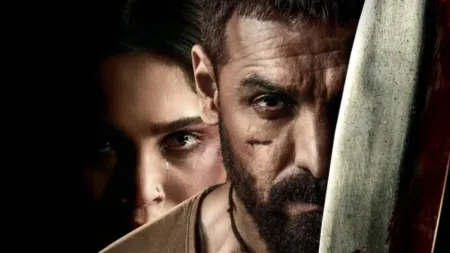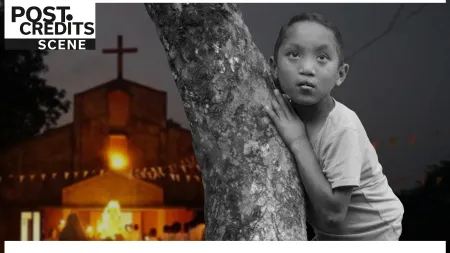Religion is the opium of the masses, they say, and genre cinema is the salvation of the silenced. In 1973, director Victor Erice’s landmark film The Spirit of the Beehive sidestepped scrutiny by using symbolism to make sharp statements about the Spanish dictator Francisco Franco. Bound by strict censorship, directors in Iran have pushed the medium into bold new directions. But instead of countering with creativity, the Indian mainstream — barring a few outliers, of course — has mostly submitted to the flimsy whims of those in power.
In these difficult times, independent filmmakers — men and women with everything to lose — have shown real spine. And one of the finest — if not the finest — homegrown examples of dissent is director Dominic Megam Sangma’s Rapture, titled Rimdogittanga in the original Garo language. After a festival run last year, the magic realist drama was recently given a theatrical release; not nearly wide enough, however, to challenge the local dog and pony show, let alone the government. But it’s a movie that deserves championing, not only for its courage, but also for Sangma’s breathtakingly original vision. Even if it were about lottery tickets, it would deserve a degree of respect for the sheer quality of Sangma’s filmmaking. Thankfully, it’s about something more meaningful.

Also read – Maagh – The Winter Within: The finest Indian film of the year, the only alternative to all the Animals out there
 A still from Rapture.
A still from Rapture.
Rapture uses a remote village in the Meghalaya hills as a microcosm for the entire country. When a young boy goes missing hunting for cicadas at night, the entire community begins to suspect mysterious intruders who’ve been spotted lurking around the neighbouring villages. Nobody has seen them, but everybody has heard about them. Some villagers are sure that these intruders are collecting victims for their illicit organ trade, but others believe that the kidnapping is the doing of a forest-dwelling nymph.
Meanwhile, the entire community is distracted from this grave incident by the arrival of a large statue of the Virgin Mary. The local pastor — he’s depicted as a greedy, lecherous glutton by the clearly incensed Sangma — warns the villagers of an impending apocalypse that will last a full 80 days. “In these fearful times we need generous offerings,” he says in one scene. In addition to one-tenth of every household’s monthly earnings, the pastor demands a ‘hafta’ of at least Rs 1000, for what he calls the Apocalyptic Relief Fund.
 A still from Rapture.
A still from Rapture.
Rapture is one of the first few Indian films that directly confronts the collective trauma we experienced during the pandemic. The film unfolds through the perspective of Kasan, a 10-year-old boy who witnesses the mass hysteria that begins to pollute the minds of his people, and his father Nengsal, the village security chief who slowly finds himself succumbing to the panic. It’s telling that Kasan suffers from night-blindness — a symbolic character trait that works on multiple levels.
“I never gave in to thinking about darkness,” Nengsal says in the film’s haunting climactic scene, rivalling the one in Call Me By Your Name for its pained depiction of parenthood. “I dreaded it more than anyone else. I kept thinking about how to protect my family. But now, I long for the darkness to engulf us, I wish it comes sooner so that I can take refuge in it.” The scene offers perhaps the most succinct summary of Sangma’s bleak worldview. “Maybe such apocalyptic destruction is the only way to level everything,” he seems to be saying, via the defeated Nengsal.
The already dreamlike drama takes on an otherworldly dimension when Kasan witnesses the lynching of a suspected kidnapper. His father is also revealed to be a part of the mob. Kasan’s father instructs him to keep what he saw to himself, thereby cursing him with a complicity that he will probably hold on to till the end of his days. He’s 10. He was already showing signs of indoctrination some scenes ago, when he came across a family of refugees in the woods — clearly Muslim; runaway Rohingyas perhaps — and appeared to recoil in fear. It’s one of the most unflinching moments in a movie filled with them. What hope is there for the future if the kids aren’t spared either?
 A still from Rapture.
A still from Rapture.
Read more – Aattam: A masterclass in misdirection, Anand Ekarshi’s anti-whodunnit is an early contender for the movie of the year
Rapture is a hypnotic drama about loss-of-innocence, a fable about the othering of minorities, and a cautionary tale about the perils of misinformation. In one scene, while visiting his wizard-like grandfather — a man that has probably influenced him more than his father — Kasan playfully starts banging a thali. The look that he receives in return pretty much sums up what any rational person would’ve thought of the infamous “janta curfew” day. It’s essentially the only moment of levity in a film that thrives on dread.
“This is not the right place for Kasan to grow up,” Nengsal tells a friend in one scene. Having resigned to the hopelessness around him, he is finally being forced to reckon with his misdeeds. Lightning strikes from the skies, cattle are killed, the moon turns blood red. The end is nigh, Rapture says, locking the viewer into a meditative state along with itself. Like the best allegorical films, it relies on two key assumptions: that the audience — people like you and I — is fully equipped to appreciate it, while those in power are probably too stupid to get what’s going on. A movie that respects your intelligence and mocks the sort of people you detest? More, please.
Post Credits Scene is a column in which we dissect new releases every week, with particular focus on context, craft, and characters. Because there’s always something to fixate about once the dust has settled.
Post Credits Scene is a column in which we dissect new releases every week, with particular focus on context, craft, and characters. Because there’s always something to fixate about once the dust has settled.
Disclaimer: The copyright of this article belongs to the original author. Reposting this article is solely for the purpose of information dissemination and does not constitute any investment advice. If there is any infringement, please contact us immediately. We will make corrections or deletions as necessary. Thank you.







